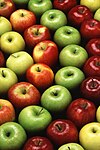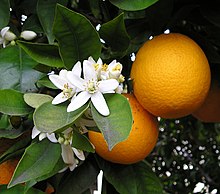Apples and oranges

Some comparisons are said to be like "comparing apples and oranges," meaning that they are invalid. Valid comparisons are like to comparing "apples to apples." This idiom is common, but certain scholars have critiqued it, both in serious publications and in weblogs and spoofs. The idiom may be unique to English, as in some other languages, the word for " orange" depends on a comparison to apples.
Criticism of the idiom
Legal criticism and mathematical response
Law professor Eugene Volokh argues that the idiom is inappropriate, because "we compare apples and oranges all the time! We compare them by price, by how much we like the taste, by likely sweetness and ripeness, by how well they'll go in a tasty fruit cocktail, and so on. In fact, every time we go to the store and buy apples rather than oranges — or vice versa — we are necessarily (if implicitly) comparing apples and oranges." He suggested that a better idiom would involve "two items that really are radically dissimilar" like "apples and democracy" or "oranges and the multiplication table." He believes that such "comparisons really would be hard to conduct." Volokh's readers noted that even such radically dissimilar nouns as apples and the multiplication table can be compared fairly easily, as when one compares the number of syllables in each word or the relative age at which children learn each concept. [1] Sasha Volokh argued that mathematically, only the properties of apples and oranges can be compared; the fruits themselves cannot be. Mathematically astute bloggers and readers forced him to partially retract his analysis, however. [2]
Scientific criticism

At least two scientific studies have been conducted on the subject, each of which concluded that, not only can apples be compared to oranges fairly easily and on a low budget, but also that the two fruits are quite similar. The first study, conducted by Scott A. Sandford of the NASA Ames Research Center, used spectrometry to analyze both apples and oranges. The study, which was published in the Annals of Improbable Research, concluded that "the comparing apples and oranges defense should no longer be considered valid. This is a somewhat startling revelation. It can be anticipated to have a dramatic effect on the strategies used in arguments and discussions in the future." [3]
A second study, written by Stamford Hospital's surgeon-in-chief James Barone and published in the British Medical Journal, noted that the phrase "apples and oranges" was appearing with increasing frequency in the medical literature, with some notable articles comparing Desflurane and " propofol and Salmeterol" and " ipratroprium" to "apples and oranges." The study also found that both apples and oranges were sweet, similar in size, weight, and shape, that both are grown in orchards, and both may be eaten, juiced, and so on. The only significant differences found were in terms of seeds (the study used seedless oranges), the involvement of Johnny Appleseed, and color. [4]
The Annals rejoined that its "earlier investigation was done with more depth, more rigour, and, most importantly, more expensive equipment" than the British Medical Journal study. [5]
Oranges as a type of apple
In many languages, oranges are, implicitly or implicitly, referred to as a type of apple, specifically a " golden apple." For example, the Greek χρυσομηλιά, and Latin pomum aurantium both literally describe oranges as "golden apples." Other languages like German, Finnish, Hebrew, and Russian have more complex etymologies for the word orange that can be traced back to the same idea. [6] For example, the Hebrew word תפוז is a shortened form of "תפוח זהב", or "golden apple."
See also
- Apples to Apples, a game
Colleen Nestler
In December 2005, Colleen Nestler, who alleges that David Letterman caused her "mental cruelty," briefly succeeded in obtaining a temporary restraining order against Letterman. In 1993, Nestler says she began sending "thoughts of love" to him, and that he responded with "code words & obvious indications through jestures (sic) and eye expressions" indicating his desire to marry her and make her his co-host. Nestler requested that Letterman not "think of me, and RELEASE ME from his mental harassment and hammering." According to Nestler, Regis Philbin, Kathie Lee Gifford and Kelsey Grammer were also involved. Surprisingly, District Judge Daniel Sanchez awarded the restraining order, which required that Letterman, who works in New York, stay at least 100 yards away from Nestler, who lives in Santa Fe. Letterman was also required not to threaten, harm, or annoy her, though it is not clear if this prohibits the use of "code words" on his show. After a flurry of commentary and a request to quash the order, Sanchez invalidated the order.
Letterman's lawyers called the order "obviously absurd and frivolous" and "an unfortunate abuse of the judicial process." A motion to quash the order noted that Sanchez lacks jurisdiction over Letterman, and that the case did not meet the legal requirements for such an order in part because Nestler never gave Letterman the necessary papers. Letterman's lawyers also requested that Neslter be barred from making future allegations against him, arguing that "While Ms. Nestler may deserve compassion and assistance, allowing her to bring claims against Mr. Letterman is not in her interests or in the interests of justice," and argue that Nestler's allegations could permanently damage his reputation.
Law professor Eugene Volokh doubted that the order will have much of an effect on Letterman, but considered the case "outrageous" because "a patently frivolous allegation" restrained Letterman's liberty "without any remotely conceivable justification." With regard to Sanchez, he concluded that "Either the judge read this carefully and thinks the order is well-founded, in which case he isn't a very smart judge. Or he didn't read this carefully, and on reflection must realize that he's made a mistake, in which case his statement (assuming that the newspaper accurately paraphrased them) that he didn't make a mistake and that he read Nestler's application seems less than candid."
Volokh's colleague, David Kopel, a gun rights advocate, used the case as an opportunity to condemn the restrictions Federal Temporary Restraining Orders place on their targets in terms of self-defense, and the "feminist community" that supports such restrictions and encourages "the authorities always to 'believe the victim' who complains of intimate partner abuse." Kopel believes that the case shows that such restraining orders are issued too readily and are too restrictive.
References
Legal
- Nestler V. Letterman, Santa Fe District Court.
- Colleen Nestler v. David Letterman: Application for a Restraining Order. PDF file. Nestler's application and statement.
- Colleen Nestler v. David Letterman: Temporary Restraining Order. PDF File. Letterman's restraining order.
- Expedited motion by special appearance to quash temporary restraining order. PDF file. Letterman's legal response.
News
- Letterman lawyers: End Santa Fe claim, Santa Fe New Mexican, December 21, 2005.
- Judge tosses out restraining order against David Letterman, Associated Press, December 28th, 2005.
Analysis
- Is this some solstice fool's joke? The Volokh Conspiracy, December 21, 2005.
- Is it illegal for David Letterman to own a gun? The Volokh Conspiracy, December 22, 2005.